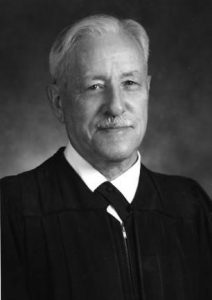
Photo info …
Credit: Indianapolis Recorder Collection, Indiana Historical SocietyView Source
(Aug. 14, 1897-June 16, 1986). Born and raised in the small farm town of Wheatland, Knox County, Niblack graduated from Indiana University in 1922 (Phi Beta Kappa) and Benjamin Harrison Law School, Indianapolis, in 1925. He was successively a school teacher, newspaper reporter, lawyer, deputy prosecutor, state senator, judge, and author. His autobiography, (1973), affords a window into Indianapolis life and politics throughout much of the 20th century.
As a newspaper reporter for the (1922-1925), Niblack reported daily on the criminal trials and political activities at the Marion County Courthouse. He also exposed many activities of the powerful which had endorsed and supported many local political figures, mostly Republicans. As deputy prosecutor, Niblack assisted in all the grand jury investigations and sensational trials brought from 1926 through 1928 against a number of Klan officeholders for bribery, corrupt practices, and malfeasance of office.
Often at odds with the county organization because of his anti-Klan activities, he won the offices of state senator (1929), superior court (1946), and circuit court (1956) without its official support.
He remained a judge of the Marion County Circuit Court through 1974. Additionally, in 1929, Niblack spearheaded a newly formed Citizens School Committee to elect a nonpartisan slate of candidates to the Indianapolis School Board and, until 1964, supported its efforts to improve the quality of education in the city.
With the help of prominent Republican finance people and incumbent officeholders, Niblack organized the Republican Action Committee (RAC) in 1966. It endorsed a complete slate of candidates for county and township offices against the regular Republican county organization, and the RAC candidates won overwhelmingly. As a result, the county Republican chairman, , relinquished control of the party.
The RAC loyalists took over undisputed control of the party for a great many years thereafter. Niblack remained a key advisor and mentor to the new Republican leadership until 1974, the year he lost his first election, when all county Republican officeholders were defeated. Niblack moved to Washington, Indiana, in 1975, where he engaged in the part-time practice of law until his death.

Help improve this entry
Contribute information, offer corrections, suggest images.
You can also recommend new entries related to this topic.

